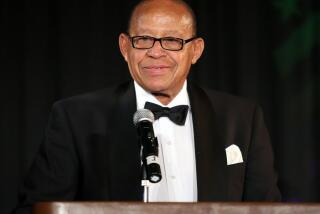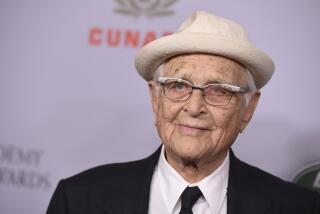Norman Corwin and Radio: THE GOLDEN YEARS by R. LeRoy Bannerman; foreword by Erik Barnouw (University of Alabama: $28.50; 275 pp., illustrated)
- Share via
Prof. LeRoy Bannerman has sketched Norman Corwin’s entire career, from his first childhood experiments at writing to recent television and stage ventures. The bulk of the book covers the three “golden” decades when Corwin’s name meant absolute magic to a nationwide radio audience.
From his invitation to join the CBS Radio Network in 1938 as producer and writer of a poetry program, until his later successes in the 1960s producing for the United Nations, Corwin represented the acme of radio creativity. “The Columbia Workshop,” “Twenty-Six by Corwin,” with the specials, “We Hold These Truths” and “On a Note of Triumph” were genuine events in the cultural life of this country.
Drawing heavily on Corwin’s unpublished memoirs, Bannerman gives us a fairly complete year-to-year, even week-to-week and sometimes day-to-day, narrative of Corwin’s work at the time: the writing deadlines, the network pressures, the production details that consumed Corwin’s life ceaselessly. Sometimes these details are illuminated; occasionally they tire the reader who would like to delve more deeply into the creative processes that were producing such a sustained burst of genuine originality.
For there isn’t any doubt, even though memory has evaporated, leaving only the titles and a remembered sense of enchantment, that Corwin grasped the possibilities of radio writing like no one else: His sense of its fluidity, its intimacy, its range of emotional life, its ability to swing the listener from distant stars to the neighbor’s footsteps, gave him an instrument to express feeling and ideas that were extraordinarily in touch with the country at the time. Although the book is generous with short quotations from a few of Corwin’s major works, a detailed account of one script, such as “The Odyssey of Runyon Jones,” would have been welcome.
The decline of radio as our most popular mass medium is depressing to read about, particularly since it meant the end of Corwin’s opportunities just when he was reaching a new plateau of brilliance. Much more painful, however, is the story behind the attacks on his integrity engendered by the McCarthy period. Since Corwin spoke to and for Americans during a particularly difficult and heroic period, it is worse than ironic that his career was crippled during the bitter peace that followed World War II and that his voice was effectively silenced.
Bannerman’s book leaves something to be desired when it comes to understanding what Corwin accomplished. He brought to radio writing the suppleness and compression that Eliot and Pound had already introduced to poetry. A search for Corwin’s sources--his models are Whitman and Sandburg and Wolfe, we learn in passing--would be more illuminating than knowing where he lived. Quoted newspaper reviews are not a substitute for a more considered analysis of technique. Erik Barnouw’s brief foreword is a model of succinct and interesting scene setting.
But Bannerman’s enthusiastic book gives us the pleasure of spending a few hours again with Norman Corwin, remembering the pleasure he gave us. How much we all owe to him.
More to Read
Sign up for our Book Club newsletter
Get the latest news, events and more from the Los Angeles Times Book Club, and help us get L.A. reading and talking.
You may occasionally receive promotional content from the Los Angeles Times.










